CCQR-261: Colorado Rockies Backpacking, Rafting, & Rock Climbing Outdoor Educator
Course Code: CCQR-261
Start Date: 6/14/22
End Date: 8/7/22
Consolidate multiple technical skills across a variety of environments, all while learning the outdoor leadership and education skills required for employment within our industry from the premiere outdoor educators at Outward Bound.
An Outdoor Educator course provides the training required to enter a career in the outdoor industry and is ideal for aspiring outdoor educators. You’ll experience firsthand the entire process of how an Outward Bound course is run while being trained to the level of a new instructor. This course requires no previous wilderness background; you’ll experience a mixture of theoretical and philosophical workshops, intense technical training and assessment, backcountry expeditions as well as opportunities to build your resume and connect with other professionals—both seasoned and aspiring.
Sawatch Range, Colorado
The Sawatch sub-range of the Colorado Rockies is home to Colorado’s two highest peaks: Mt Elbert (14,439’) and Mount Massive (14,429’). The range is known for expansive, rolling alpine terrain and multiple high peaks, and encompasses the headwaters of the Arkansas River. The source of the name is somewhat disputed but some source it to Ute words meaning “green place” or “blue water.” These regions are within the ancestral lands of the Núu-agha-tʉvʉ-pʉ̱ (Ute) nation.
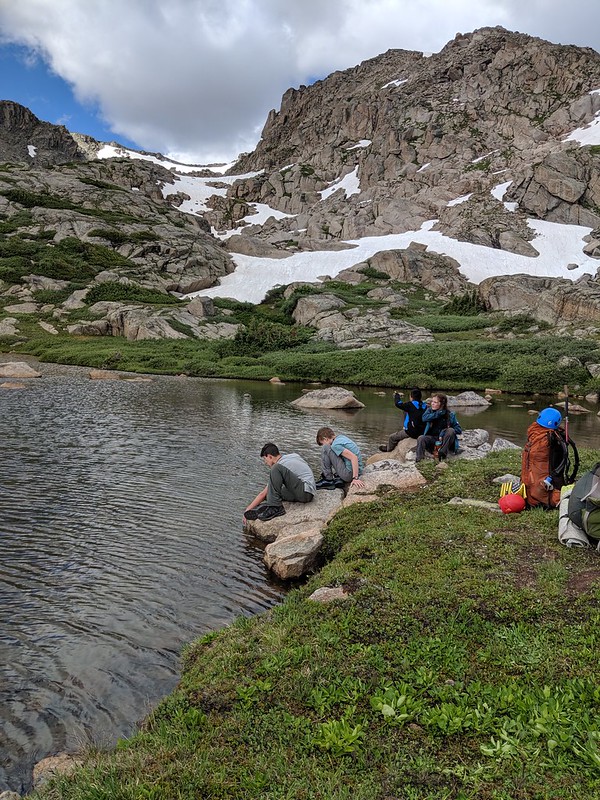
Photo: Terence Copeland |📍Núu-agha-tʉvʉ-pʉ̱ (Ute) lands
Leadville Mountain Center, Colorado
Colorado Outward Bound’s 600-acre property at the base of Mount Massive. Our base camp encompasses mountain streams, wild plants, fields and forests. Lake Fork Creek (that runs into the headwaters of the Arkansas River) runs near the east of our property and the Colorado Trail borders us to the west. If the timing is right, colorful wildflowers will brighten the trails through the LMC. You might share camp with elk, deer, chipmunks and myriad other wildlife. This region is within the ancestral lands of the Núu-agha-tʉvʉ-pʉ̱ (Ute) nation.
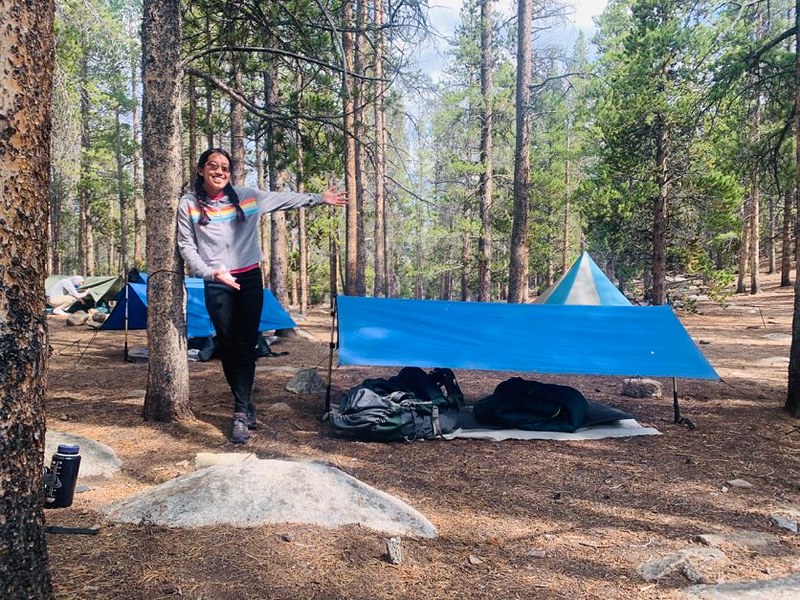
📍Núu-agha-tʉvʉ-pʉ̱ (Ute) lands
Vedauwoo, Wyoming
In an untamed corner of Wyoming’s Medicine Bow National Forest, the granite jewels of Vedauwoo (pronounced “vee-dah-voo”) beckon rock climbers. This surreal land features phenomenal formations of rock nestled into aspen and pine forests. This is the place to discover the perfect mix of wilderness and classroom, as well as an expansive spectrum of beginner to advanced crack and face climbing. The climbing routes vary in length from 50 feet to 200 feet and provide excellent opportunities for both single- and multi-pitch climbing. These regions are the ancestral lands of the Arapaho, Cheyenne and Očeti Šakówiŋ (Sioux) nations.
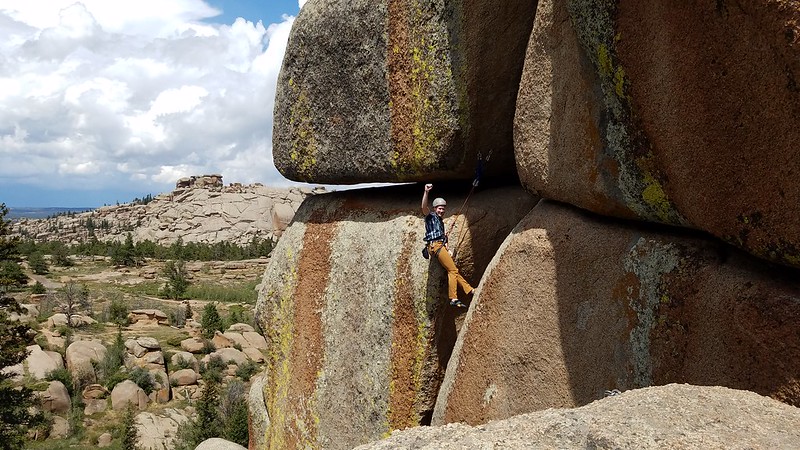
Photo: Matt Olsen |📍Arapaho, Cheyenne and Očeti Šakówiŋ (Sioux) lands
Desolation and Gray Canyons, Utah
Surrounded by the Tavaputs Plateau and bordered by the Uinta and Ouray Reservation on the east, the journey on the Green River begins in Desolation Canyon near Sand Wash. Throughout the canyon, there are spectacular rock formations, archaeological sites and abandoned ranches including McPherson Ranch, once frequented by Butch Cassidy's “Wild Bunch.” The tiered rock walls of Desolation give way to the earthy bluffs of Gray Canyon, creating a striking contrast that characterizes the next 25 miles of the journey.
On longer rafting courses you may continue your journey down the Green River through Labyrinth Canyon, where the river dives deep into the pink sandstone of the Navajo Formation which characterizes southeastern Utah and the Canyonlands area with narrow winding side canyons, orange Wingate cliffs, pinnacles and ledges. These regions are within the ancestral lands of the Ute and Diné Bikéyah nations.
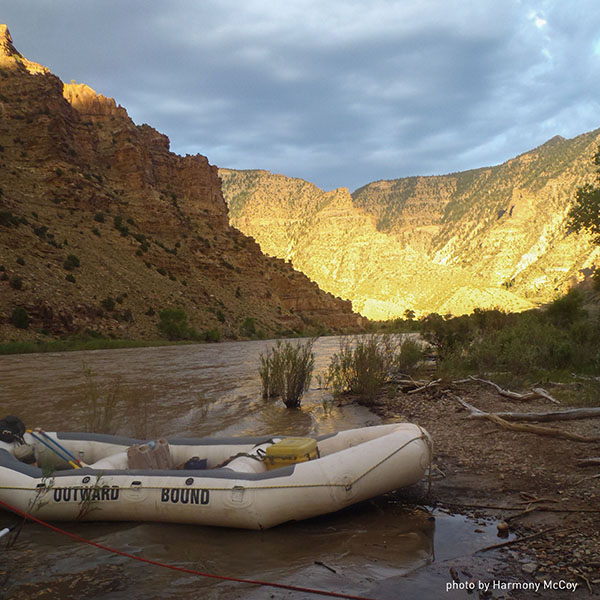
Photo: Harmony McCoy |Ute and Diné Bikéyah lands
What is a land acknowledgment?
At the Colorado Outward Bound School, we include land acknowledgments in our work as a formal way to recognize and respect the traditional territories and Indigenous Peoples as stewards of the land. It is important to understand and acknowledge the comprehensive past, present, and future of the places we travel and to seek to understand our role therein. To recognize the land is an expression of gratitude and appreciation we give to the Indigenous Peoples who have been living and working on the land from time immemorial. Read more about land acknowledgments at Outward Bound here.
Alpine Backpacking
Alpine Backpacking will develop a foundational outdoor skillset for students allowing comfortable living during course. Traveling mostly above treeline, students will carry everything they need - food, shelter, clothing and gear – allowing them to go deep into the wilderness where few people go. Backpacking provides a sense of freedom, allowing students to eat when hungry, set up camp when tired, and exercise complete control over what is accomplished each day. The simplicity of backpacking gives students the opportunity to focus both internally on their own thoughts, as well as externally to connect deeply with others as they talk, sing, play games and spend time together without distraction. With the Rocky Mountains as a backdrop, students are introduced to backpacking with lessons in basic travel and camping techniques. As this section progresses, students learn Leave No Trace techniques, map and compass navigation, camp craft, and obtain an understanding of the area’s human and natural history.
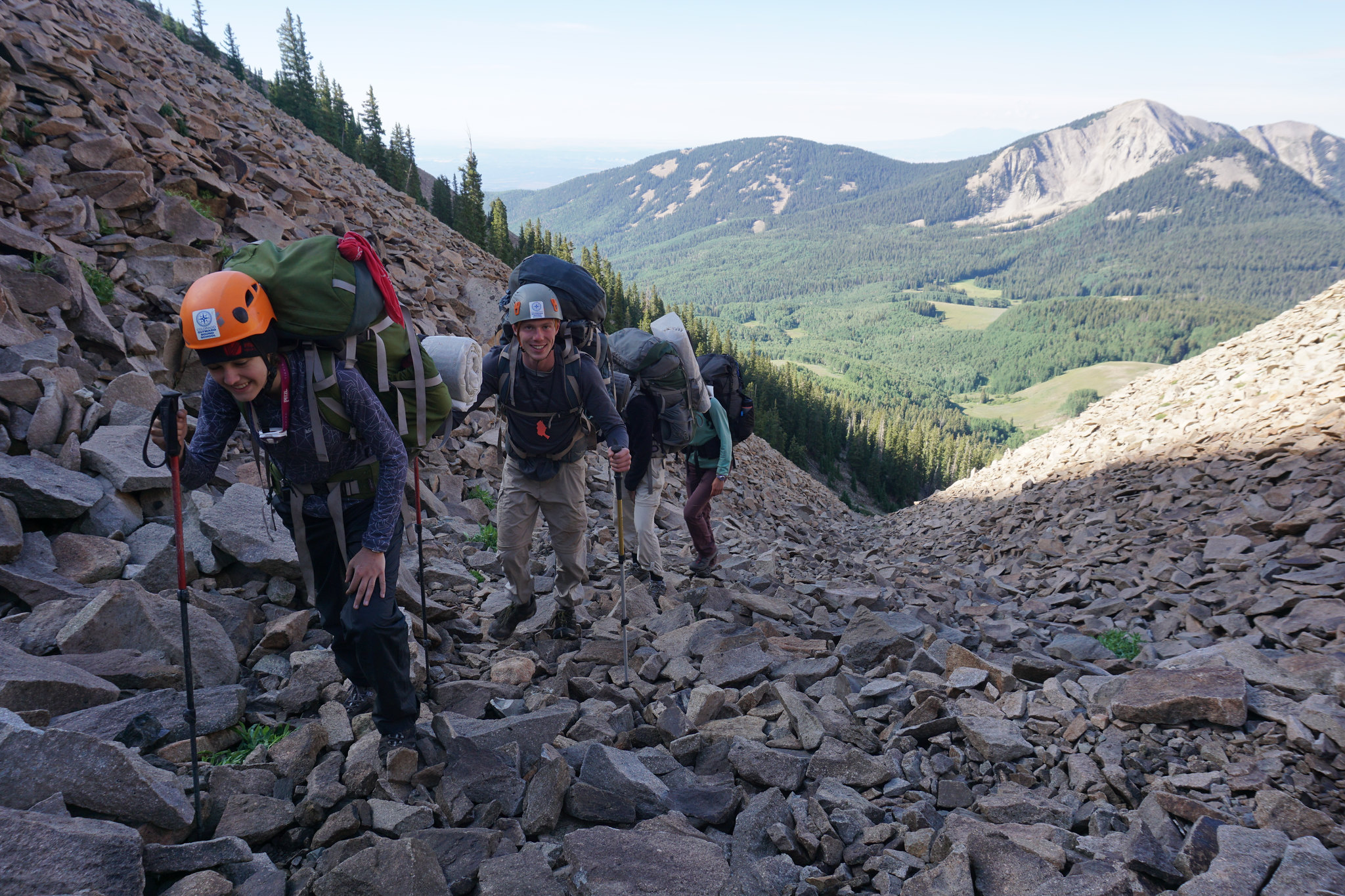
Photo: Dave Erbe |📍Núu-agha-tʉvʉ-pʉ̱ (Ute) lands
Rafting
On the river, each day is spent learning to navigate various obstacles and how to anticipate the forces of the current from upstream. You and your companions will work to become a team, coordinating your spacing and paddle strokes. You will have an opportunity to be the captain of your crew and put to use what you’ve learned as you maneuver your raft through Class 2-4 rapids. Interspersed between the rapids are flat-water sections where there is a current, but no whitewater. At times, you will take advantage of this calm water to hone your skills and enjoy the view. Time in a raft is ideal for getting to know each other and forming boat pride, laughing your way downriver as you relax into river life. Afternoons can bring strong up-canyon winds, which create a challenge as you dig in to reach the camping destination. Rafting connects you to the river: the oasis of flora and fauna (including humans!) that rely on the river to survive in the desert. The soaring canyons complement the roar of whitewater, as well as the silences that can only be found in such remote beauty.
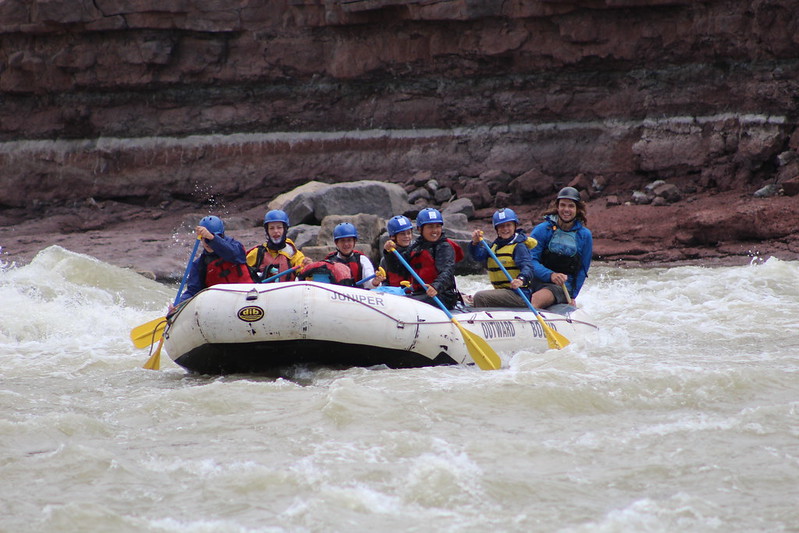
Photo: Curtis Huey |📍Núu-agha-tʉvʉ-pʉ̱ (Ute), Diné, and Pueblos lands
Rock Climbing
Rock Climbing creates opportunities for students to enterprise their curiosity, practice tenacity and perseverance, and learn skills which will progress them to greater heights. Climbing allows learning of new body mechanics, balance, and energy maintenance techniques which will help students climb efficiently and unlock the incredible feeling of flowing up a route. Students will learn there are many ways to climb the same rock, allowing each climber to solve the puzzle in their own individual way. During this section, students will learn basic climbing techniques, helmet and harness use, climbing commands and belaying, and anchor building principles. Depending on the length of the section, students may have the opportunity to attempt multi-pitch climbs or lead climbing.
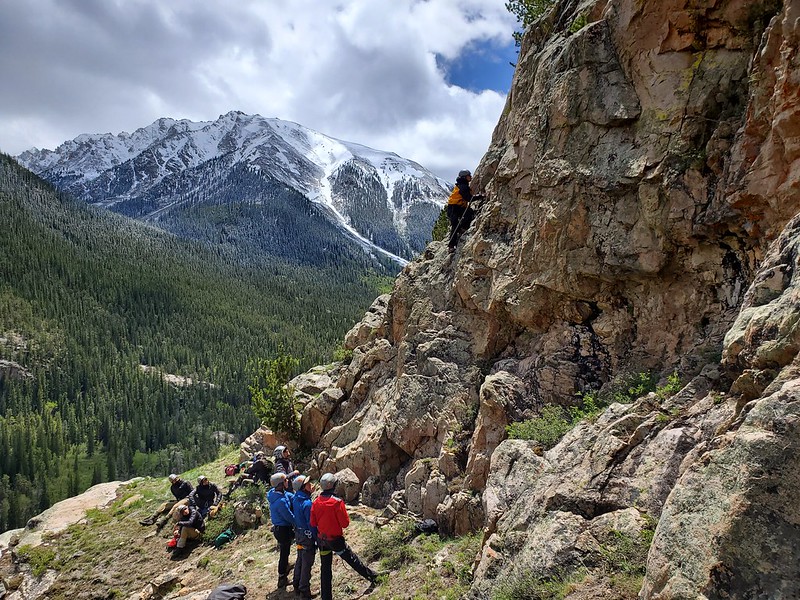
Photo: Joe Kubis |📍Núu-agha-tʉvʉ-pʉ̱ (Ute) lands
Guided Reflection and Transference
At Outward Bound we believe there is no learning without reflection. Throughout course, you will be prompted to reflect on what you’re experiencing on course, and what it means in the greater context of your life. Sometimes this is a journaling exercise, sometimes a group sharing experience, and sometimes a moment of solitude to sit and think. You spend focused time toward course progression end exploring how your new knowledge, skills and attributes can apply to your life after course.
Solo
Solo is a time when you’ll get the opportunity to spend time alone during course. With sufficient food and equipment, your Solo will be a chance to reflect on your course experience, journal, and connect with nature. Depending on your course length and environmental factors, Solo can range from 30 minutes to an overnight experience. You will not travel during this time and your Instructors may check on you occasionally. Your solo site will be close enough to your Instructors in case of emergency, but far enough removed to enjoy solitude. Many students are initially nervous about solo, but later recall it as one of the highlights of their course.
Peak Attempt
Peak Attempts present an opportunity for challenge, teamwork, and the need to pull together all of your learned skills for success. Your expedition will include at least one peak attempt. Peak attempts are major enterprises and typically require early morning starts and can take all day to complete. Weather, or other factors including group dynamics and physical readiness, may preclude even an attempt to ascend a peak.
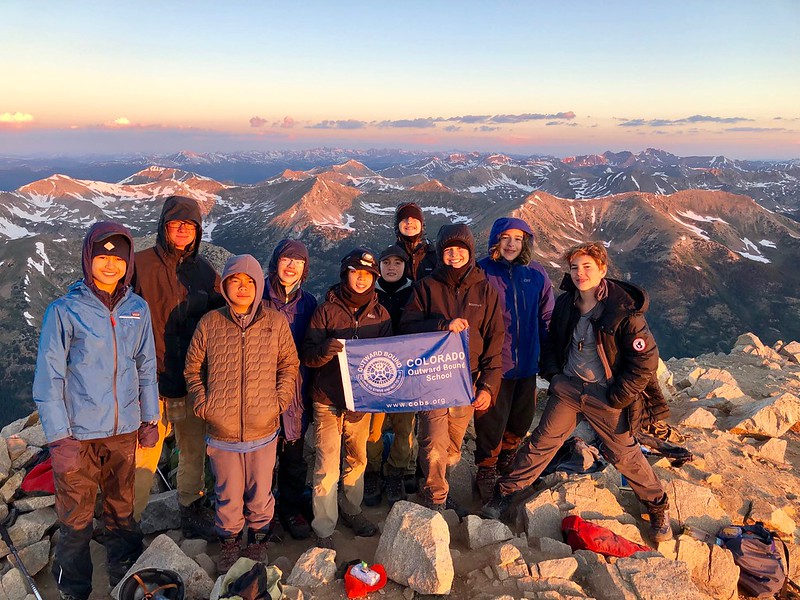
Photo: Naomi Winard |📍Núu-agha-tʉvʉ-pʉ̱ (Ute) lands
Challenge Event
A Challenge Event may occur at the end of a student's course experience. These are opportunities to test the perseverance, endurance, and grit that you've developed on course. A challenge event might be individual, like long run or peak attempt. Your event might be a group focused challenge, including long final travel days or group challenges that require all of the skills and teamwork your groups has learned. The purpose of a challenge event is to help students realize the extent of their growth, physically, mentally, and emotionally, and to take home these learnings in an unforgettable way.
Service
Service is a pillar of the Outward Bound experience. On each course, students learn to practice intentional service to themselves, to others and to the environment. This may look like practicing self-care or supporting a crewmate who is having a hard day. Participants also learn to Leave No Trace ethics, practicing service to the environment by preserving and respecting the fragile ecosystems they encounter. Students experience firsthand the social and emotional benefits of acts of service. They are encouraged to bring this ethic of care to their life back home.
Low Ropes & Initiatives
During the first few days of your course at the Leadville Mountain Center, you may have the opportunity to engage as a team with Low Ropes elements and facilitated Initiatives. During this day, your Instructors will progress you and your group through a series of challenges, designed to develop problem-solving skills, communication, and overall teamwork. Elements may require complete team cooperation or individual contributions and will help your group build a foundation for increasing challenges to come. Initiatives, including our Orienteering Course, will help the group learn and practice key lessons to be successful moving forward on your course.
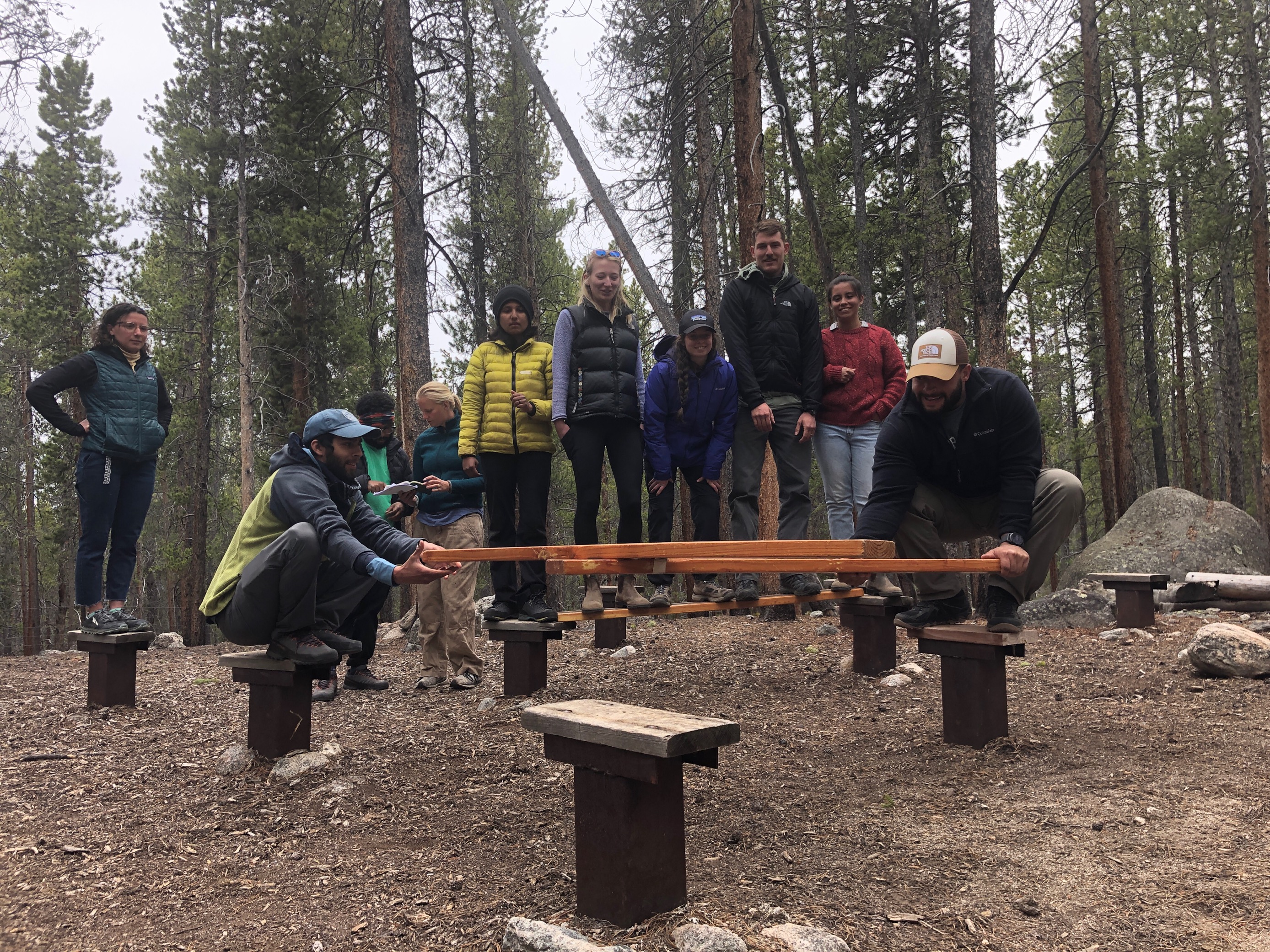
Photo: Leslie Spinelli |📍Núu-agha-tʉvʉ-pʉ̱ (Ute) lands
Wilderness First Responder Course
Despite the best risk management, sometimes accidents happen, and knowing how to respond to injuries in a backcountry setting is a key skill for aspiring outdoor leaders. During this course, you will spend eight days in a classroom at our basecamp, learning about wilderness medicine. You will have the opportunity to earn a Wilderness First Responder (WFR) certification during this course, which is considered a standard for many leadership jobs in the Outdoor Industry.
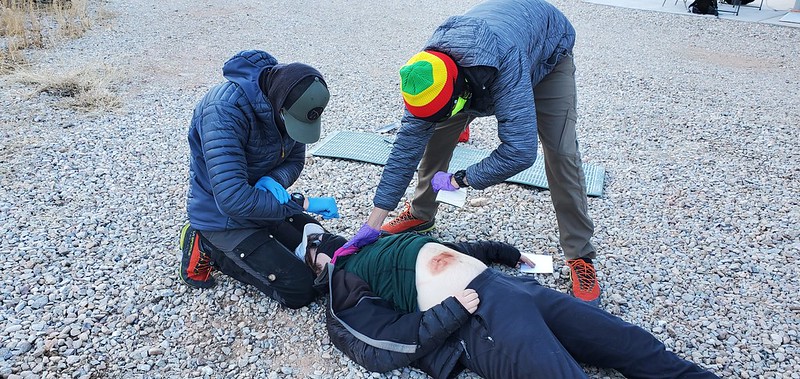
📍Núu-agha-tʉvʉ-pʉ̱ (Ute) lands
Sample Itinerary
The following is an example of what your itinerary may look like. Your actual course plan will vary according to weather, your group’s skills and abilities, and Instructor preferences.
Day 1-2: Course Start; set up front country camp, gear check, preparation, low rope elements and initiatives, orienteering.
Days 3-9: Alpine Backpacking; Students will learn how to navigate on and off trail, to fit and pack a backpack, to build shelters, attempt peaks, and to cook delicious meals in the backcountry. This is a week to develop individual and shared goals and get to know each other.
Days 10-22: Rock Climbing; Students will develop climbing skills and craft, have opportunity for student taught lessons, refine their feedback and leadership skills, learn expeditionary food systems and rationing.
Days 22-29: Wilderness First Responder course
Day 30: Travel to Moab UT for River section
Days 31-39: Rafting Section; Students will learn how to read whitewater and work toward captaining a boat in whitewater rapids. This transition gives students a broader understanding of how to lead an expedition as different activities affect group dynamics and different terrain requires different safety management.
Days 40-41:Travel back to Leadville and prepare for teaching practicum
Day 42:Teaching Practicum; Students will be given an opportunity to lead a day trip for a group of local youth. Activities may include rock climbing, day hiking, or other wilderness skills.
Days 43-53: Alpine Backpacking Finals; Students will lead themselves on a final expedition. Depending on conditions and group progress, Instructors will step back as much as possible to allow teams to make decisions. Opportunity for a solo experience to reflect on the learnings from course.
Days 54-55: Course End; gear deissue, exit interviews with instructors, celebration, and travel home.
Our expeditions help students grow into the best version of themselves. We use adventure in the outdoors to help students discover their strengths and build authentic connections with their peers. Compassion for oneself and others is foundational to the Outward Bound experience. As students develop outdoor skills, they also gain confidence and leadership tools that will last a lifetime. Course outcomes include:
- Belonging – students form deep connections founded upon respect, inclusion, and compassion
- Reflection – students learn self-awareness and practice empathy towards others
- Physical Engagement – students develop awareness and confidence in their bodies
- Courage – students develop the confidence to speak up for themselves and persevere through challenges
Watch to Learn More
Tuition
You can pay your tuition online through your Applicant Portal or make the payment over the phone by calling 720-381-6589.
If your payment is not received by the due date listed in your Enrollment Email and on your Applicant Portal, you will risk losing your spot on course and your $500 deposit. Please review our Admissions and Cancellation Policies.
Travel Insurance
Airfare, travel costs, and non-refundable tuition payments are expensive. Insurance to protect your trip and course is strongly encouraged. We recommend insuring these costs from the third-party provider InsureMyTrip. This provider has coverage options that include travel costs and non-refundable tuition costs. For more information and to receive a free quote, click here.
Click here for COBS COVID-19 Program Practices